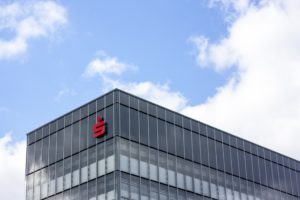On 21 July 2016, the German Federal Supreme Court (BGH) gave its verdict on the validity of an abstract red colour mark of the umbrella organization of German savings banks (“Sparkassen”). It seems like the BGH is addressing a new colour every year.
The Sparkassen use this colour for their business since several decades e.g. on signs outside their branches, for their red savings books and marketing material. (Decision I ZB 52/15 – Sparkassen-Rot).
The German Sparkassen had been involved in a lawsuit against the Spanish bank Santander for years about the usage of the colour red. The BGH decided to keep saving the colour trademark for the Sparkassen in Germany and refused Santander’s application to delete the colour trademark which was a great win for the the Sparkassen.
How did this happen?
The abstract colour trademark „Rot“ (HKS 13) (red) was first filed in Germany in 2002, but was rejected. The Sparkassen restricted the specification to certain financial services in class 36 and submitted survey evidence on the acquired distinctiveness of the red colour for these services. It is registered since 2007, Sparkassen-finance group being its holder.
The PTO accepted the shown high public awareness of the colour red being associated with the Sparkassen and registered the colour trademark because of the bank’s reputation. Nevertheless not only Santander but several other banks applied for cancellation of the mark for lack of inherent and acquired distinctiveness. They all use the same colour for their corporate design as well.
The first court decision
The German Federal Patent Court (BPatG) paused the lawsuit in June 2014 and started a request for a preliminary ruling to the European Court of Justice (ECJ). In ECJ’s decision (C-217/13 and C-218/13) the judges set out the colour trademark’s cancellation, which was then suspended through the BGH because of an appeal on the point of law by the colour trademark holder (Sparkasse).
BGH’s decision
The German Federal Supreme Court indicted absolute protection obstacles because of insufficient distinctiveness. Abstract colour trademarks are not distinctive in general and not registrable according to § 8 Abs. 2 Nr. 1 MarkenG. A colour is often seen as a decorative element instead as a product label.
The trademark holder justified the acceptance of the acquired secondary meaning at the time of the decision on the application for cancellation in 2015 through various opinion research reports about the acquired secondary meaning. This means that the consumers connect the colour red as a product label with the Sparkassen, due to their consistent corporate appearance. In this case according to § 50 Abs. 2 Satz 1 MarkenG the colour trademark may not be cancelled.
In his sentence the BGH made clear that colours are not product labels and due to their insufficient distinctiveness it is also not possible to register them as trademarks. The only exception is possible, if the colour did establish in commercial traffic per se and the public is seeing a hallmark in the colour.
BGH’s decision shows how a trademark registered in Germany can last even in times of a transborder European financial sector. The consequences for Santander’s future brand presence in Germany are not yet predictable.
The BGH decision came as quite a surprise – the standard procedure under German law would have been for the court to provide guidance to the previous instance, here the BPatG, and to refer the case back to that court for a decision. The full decision, once published, will be an interesting read.
Do you want to protect your colour trademark aswell?
We would be pleased to help you in your case with our longtime experience in Brand Registration. Make a free and call without any obligation today and let us give you advise.

Sources: bundesgerichtshof.de | tagesschau.de
Bildquellen: dsgv.de | pixabay.com








Leave a Reply